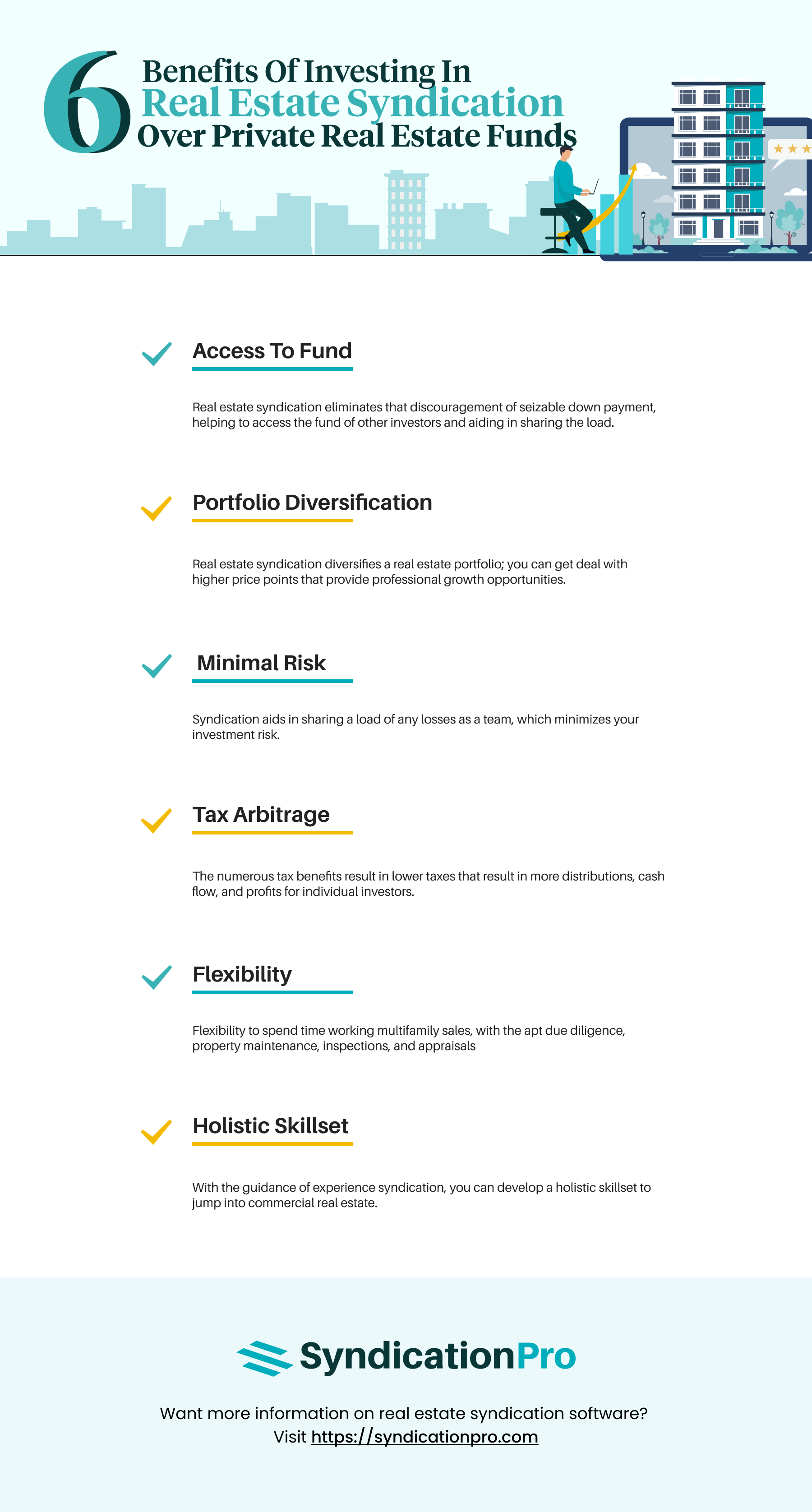
Sign up for our newsletter
Elementum venenatis porta habitant dolorel fermentum eget fermentum.
Thanks for joining our newsletter.
Oops! Something went wrong.


Real estate investing can be a challenging pursuit. Investing in real estate requires time, patience, knowledge, and, most importantly, a large chunk of cash to start with. It's not cheap, so it's no surprise that most first-time investors choose one of two strategies when considering putting their hard-earned money into an investment property: either buy a fund or buy an entire property through a syndication deal.
Investing in real estate syndication is a great way to diversify your real estate portfolio, boost its liquidity, and generate regular cash flow. On top of that, it's a low-cost method of investing your capital. Real estate investing through private funds is even more stringent.
Let's take a worm-eye view of this investing concept so you can make the right decision for your portfolio. Keep reading this article as we explore the benefits of real estate syndications over funds and plunge into the option that is right for you.
Real estate syndication helps to diversify your real estate portfolio, boost its liquidity, and generate regular cash flow. On top of that, it's a low-cost method of investing your capital. Let's check out the key six benefits of investing in real estate syndication:
Syndication companies can be an excellent choice for tax-advantaged investors looking to take advantage of the booming real estate market. When investing in syndication, the returns are quoted as an annual percentage rate.
In addition, capital gains distributions are generally tax-free, while interest and dividend income is taxed as ordinary income. The tax rate for capital gains is also lower than the income tax rate. Some of the most common deductions are:
Real estate syndications provide appreciation in the values of the underlying properties. Investors can choose between a variety of investment options. The most common is an actively managed portfolio of real estate assets managed by a portfolio manager. Other options include passively managed portfolios, exchange-traded funds (ETFs), and real estate investment trusts (REITs).
Tax-managed funds are another type of real estate investment trust that is often overlooked. These funds offer a mix of active and passive real estate tactics but are managed by a separate entity.
This separation of the investment tactics and management makes for tighter control and more predictable returns.Syndication offers liquidity and transparency that some private real estate funds lack. This includes the company's audited financial statements and other required information.
Some private real estate funds require investors to put down a sizable minimum amount of cash upfront. You may be out of capital if you need $1 million to invest in a private real estate fund. Real estate syndication generally has smaller minimum investment amounts. It is an impactful way to get exposure to the real estate market at a low cost.
Real estate returns are generally stable, which means that syndication can be an excellent long-term investment.
For example, the minimum investment amount for a real estate investment is usually $5,000-$50,000. It minimizes the barrier to entry for investors who want to put money into real estate but don't have a large amount of cash to do so. You can invest with a lower amount of $5,000 or $50,000 and still get the same returns. It enables you to diversify your investment portfolio while still getting into real estate.
Real estate syndication has a lower volatility risk than private real estate funds. The risk of losing money if real estate values fall is deduced. If you buy a bunch of shares of a private real estate fund at a low price and then real estate prices fall, you will potentially lose money.
Syndication has a lower volatility risk. They are a long-term investment that can be held for decades. You won't need to sell them when real estate values fall, and you can wait for the market to recover. It allows you to hold on to your investment for more extended periods of time without having to sell at a loss.
The structure of the scheme makes the returns more predictable and tax beneficial. As an investor in syndication, you get a slice of the profits from property income generated from the pool of similar assets. An administrator manages the property and shares the returns with investors.
Some private real estate funds operate on a self-dealing basis, allowing them to benefit themselves rather than the shareholders. In real estate, syndications are required to operate in the best interest of shareholders. This can help you ensure you get the most out of your investment.
It is a unique way to generate substantial returns on your investment. Second, real estate syndication allows you to diversify your assets across different properties, ensuring you are not overly exposed to any single investment.
Investing in real estate syndication aids in growing your wealth. Let’s scroll through the visual illusion of the benefits of investing in real estate syndication over private real estate funds to get more brevity in this context.

Real estate is among the most attractive asset classes for a balanced investor. The combination of high returns, diversification, and tax benefits make real estate a unique investment for individuals and financial institutions. Moreover, public records make real estate markets well-liquid and transparent.
Nowadays, there is a considerable demand for investors in the rental space, especially in Tier-1 cities. Due to stringent regulations, private developers are barely available in this segment. Hence, there is a vast demand for institutional investment in this space. Real estate syndication creates such an opportunity.
Investors get access to desired destinations at a much cheaper cost compared to the actual price of properties; they also get access to skilled builders and property management companies who can turn their investment idea into reality.
Another benefit of real estate syndication investment is that you can earn credit income from the properties. This income can be used to pay off the loan or make minor adjustments to the property, such as painting the walls or fixing broken furniture. It is also possible to borrow against your credit yield, which allows you to access the funds without going through a banker.
It also has lower management fees. This means more profits go to you, the investor. You can also compare management fees and see if you are getting a good deal with your existing investment company. If you are dealing with high fees, consider looking into an investment company that has lower fees. You can seek a cheaper investment company. This can help you spread your investment across more funds while still getting the same amount of money invested.
There is an inevitable amount of debate around the best way to invest. Investing in a real estate syndication or private fund can be a great way to invest your money. These types of investments combine the growth potential of real estate with the stability and security of investing in stocks and bonds. They also offer protection against inflation and market fluctuations.
Either type of real estate investment can help you provide for your long-term financial needs while providing both growth and stability for your money over time. However, the choice ultimately depends on several factors, including your personal financial situation, financial goals, and current tax situation.